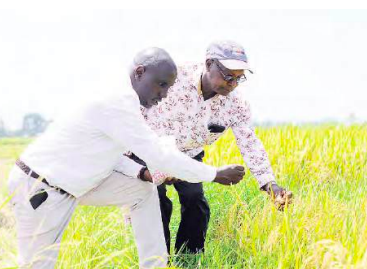
Ephantus Kariuki is reaping bumper harvests from his fouracre rice farm in Mwea.
The high-yielding, drought-resistant CIL Komboka rice variety has greatly improved his income.
Kariuki is among many farmers in Mwea, Kirinyaga county, who have adopted the new variety with the support of Capwell Industries.
The programme provides farmers with high quality seeds, guidance on crop management and consistent support throughout the growing cycle.
Once the rice matures, Capwell Industries purchases the harvest at guaranteed prices, ensuring stable returns for the contracted farmers.
The CIL Komboka rice variety has a potential yield of around seven tonnes per acre, double that of traditional varieties like Pishori.
“The CIL Komboka rice variety yields incredibly well,” Kariuki told the Star.
“On just one acre, I can harvest as many as 55 bags, compared to 25 bags of Pishori, which sometimes yields even less than 18 bags. With a price of Sh7,000 per bag, my returns from CIL Komboka are significantly higher than from Pishori.”
Capwell Industries educates farmers on best practices, land preparation and pest management.
The company also markets the rice.
“When we started farming Komboka rice here just a season ago, it wasn’t well known. But now it’s gaining traction,” farmer Caroline Wamarwa said.
“Its high yields and ability to thrive in diverse conditions make it an attractive choice, and with increasing consumer demand the market will continue to grow.”
Capwell Industries CEO Rajan Shah said the company is dedicated to supporting farmers to reduce Kenya’s rice deficit.
The country imports more than 800,000 metric tonnes of rice annually.
Shah is confident widespread growing of CIL Komboka rice will increase Kenya’s annual rice output by an additional 600 tonnes in the short term.
“We’ve been working directly with rice farmers through contract farming. We provide them with the resources and a guaranteed offtake at fixed prices,” he said.
“This arrangement has been in place for two seasons and we are focused on ensuring the farmers earn well.”
Large-scale cultivation of Komboka rice will enhance food security and improve incomes.
While food production challenges are a global issue, Shah is optimistic that innovative approaches to rice farming, such as planting CIL Komboka, can help Kenya become self-sufficient.
“We must support farmers in producing more local rice to close the gap between local production and imports,” Shah said.
As the popularity of CIL Komboka rice grows, both farmer and consumer demand will increase, creating opportunities for farmers and strengthening the supply chain.
This growth will be vital in addressing food security challenges, worsened by environmental and economic factors.
Shah said there is immense potential for Kenya to become self-sufficient in food production and less dependent on imports. He called for continued investment in sustainable agricultural practices.
“As a country, we are still far from
being self-sufficient. We currently
have an 80 per cent shortfall in rice
production alone. With strategic investments and sectoral support, we
can reduce this gap and eventually
export our surplus.”












